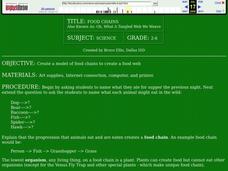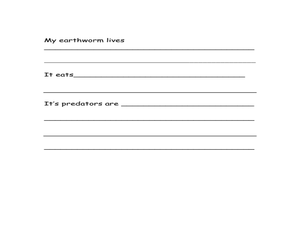Curated OER
Earthworms and Making a Wormery
Students explore the environment by researching insects. In this earthworm lesson, students utilize soil and plexiglass to build a see through wormery in which students can observe the worms at work. Students identify the benefits of...
Curated OER
Food Web Mystery
Students describe typical marine food webs, and explain why food is generally scarce in the deep-ocean environment. They discuss reasons that seamounts may support a higher density of biological organisms than would appear to be possible.
Curated OER
Food Chains and Webs
For this food chains worksheet, students identify the producers and consumers in the given food chains and describe how contaminants can biologically accumulate. This worksheet has 4 short answer questions.
Curated OER
Beaver Succession Mural
Students explore the concept of beaver pond succession. In this succession lesson, students discuss what succession is and how it works. Students create a mural to present their understanding of this concept.
Curated OER
Water Quality Survey: Monitoring the Sustainability of Pigeon Creek
Students research the History of Pigeon Creek (or any watershed in your area). In this environmental science lesson, students conduct field tests such as pH and nitrates. They collect data and compare what they collected with other groups.
Curated OER
Head to Foot
Students describe the body form and major anatomical structures of squids and describe some unusual or unique features of newly-discovered deep water squid species. They infer what types of food squids use from their anatomical features.
Curated OER
Leaving Home
Students explain the importance of larval dispersal and retention to populations. They collect data on organisms and examine it.
Curated OER
Mountains in the Sea Exploration No Escape
High schoolers study data to hypothesis about the influence of a water circulation cell on the retention of benthic invertebrate larvae in the area of a seamount. They investigate the positives and negatives of larvae retention in this...
Curated OER
Water Quality Monitoring
Students comprehend the four parameters of water quality. They perform tests for salinity, dissolved oxygen, pH and clarity or turbidity. Students comprehend why scientists and environmental managers monitor water uality and aquatic...











